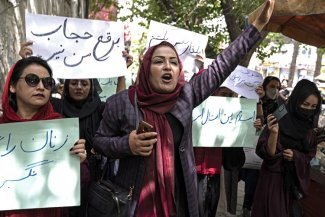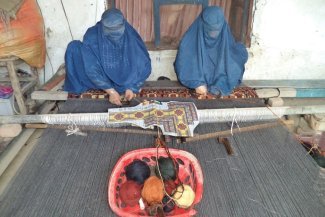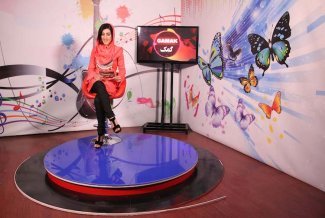Originally from Uzbekistan, from where they came 100 to 150 years ago, the 20,000 to 30,000 Jogi are largely concentrated in the north of Afghanistan. After leading a semi-nomadic life, Bibi Nazuk now lives with her son Oral, the head of a community that has decided to settle permanently on the outskirts of Mazar-e Sharif.
“Come into my home, with this sun, the heat is terrible,” calls Sabrena, bending down to enter her tent and sitting cross-legged on a thin blanket. With one hand, she lifts her azure blue burqa, revealing her face and her large dark brown eyes: “I was in the city, begging for some money. Since the return of the Taliban, it is better for women to go out fully veiled.” Like many Jogi, she has darker skin than the rest of the population. “I am from Faryab in the north-west. But my grandfather is from Tashkent in Uzbekistan,” she says.
Sabrena turns and takes hold of her baby who is crawling around her. “He is ten months old. My daughter is three. I wish I could send them to the market to collect plastic waste, but they’re still too young. Maybe in a couple of years, my little girl will be able to go.”
The Jogi camp, located on the outskirts of Mazar-e Sharif, a large city in the north of the country, is home to some 15 families and none of the children go to school. “What’s the point of going to school if you don’t have anything to eat?” asks Aisha, a neighbour who is listening to the conversation at the door of the tent. “They have to help their families! By selling the plastic they collect in the city centre, they bring in about a hundred afghani a day [€1.13], enough to buy some bread.”
While some Jogi women wear the burqa, others like Aisha are content with lighter clothing. Her thin red headscarf shows part of her hair and her colourful dress does not reach her feet.” Our nomadic life and the hardships we face mean we are more often in the public space than other Afghan women, especially for work. We have adopted more liberal values,” she says with a shrug of the shoulders.
No identity papers
Only the youngest children in the camp are walking around with their parents: “The others are at work,” says Aisha. According to a 2011 study, conducted by UNICEF in partnership with the Samuel Hall research centre in Mazar-e Sharif, 83.9 per cent of Jogi children are not part of the school system, compared to 47.2 per cent for Afghan children as a whole. Their extremely precarious situation, the semi-nomadic life and the lack of dedicated infrastructures have excluded them from the education system.
More importantly, some Jogi do not exist in the eyes of the state, making school enrolment almost impossible: “I have no identity papers,” says Sabrena, “Yet I was born in Afghanistan and I am about 25 years old now.”
In 2011, in 78.4 per cent of Jogi and Chori Frosh [another smaller semi-nomadic group] households, not one family member had a tazkira, an identity card.
These figures now need updating, as Afghanistan initiated a policy of integration some 20 years ago, according to Minority Rights Group International (MRG). “The Afghan Citizenship Law passed in 2000 stipulates that an individual living in the country for over five years, aged over 18, and not having committed any crimes has the right to apply for citizenship.”
And the 2004 constitution establishes that “all Afghans should be treated equally” and “measures should be taken to improve the livelihood of nomads”.
A growing number of the Jogi in the camp have identity papers, according to Aisha. “I got mine five years ago,” she says, taking a paper out of her pocket. “It’s a good thing, but our life hasn’t really changed. Other Afghans still shun us. We are not accepted by society and we still live in poverty.”
With each step, Aisha creates a small cloud of dust beneath her feet. The ground in the camp is not cemented. Most of the tents are made of fabric, unsuited to the Afghan winter. “We don’t have water, we go to a nearby well, and we don’t have electricity either. We’re used to these living conditions, but in winter, with the freezing temperatures, it’s very hard without a house.”
Poverty and exclusion
There is no official census, but an estimated 20,000 to 30,000 Jogi live in Afghanistan. They came from Uzbekistan 100 to 150 years ago and are mainly concentrated in the north of the country. Semi-nomadic, they move with the seasons to different regions of Afghanistan or when they are evicted from the land on which they live. But more often than not, they move in search of economic opportunities.
In recent years, a large number of Jogi have settled around Mazar-e Sharif, drawn by the bustling trade with Uzbekistan and the lure of the Blue Mosque, an architectural jewel in the heart of the city. Most Jogi make a living from begging or precarious work, often in the construction or cleaning sectors. On average, a Jogi household lives on 5,000 Afghanis a month, which is half as much as the average for the rest of Afghan households.
Sitting in a tent donated by the United Nations Refugee Agency (UNHCR), Waris rolls up the sleeves of his kurta, the garment worn by most Afghan men. The heat is stifling under the tarpaulin. “In August, it’s hard to sleep in these conditions. But the hardest thing is going to bed hungry.” Waris used to go to Iran to do construction work, but the return of the Taliban, in August 2021, has isolated Afghanistan from the rest of the region. “We don’t go abroad anymore, and we don’t have any work in Mazar either. On top of that, almost all the NGOs have left,” he says.
The international sanctions on Afghanistan have plunged the country into a deep crisis. The Jogi, poorer than the rest of the population, are among the hardest hit.
The Jogi live on the margins of society. Life on the road has created a significant gap with sedentary Afghans and a negative image has developed of the Jogi community. Waris deplores the discrimination the Jogi suffer: “The women who beg are often insulted on the streets. We are seen as outcasts.”
The women tend to be the main targets of the prejudice. More of them work than the rest of the female population, and some are even the sole breadwinners for their families. They are accused, by malicious rumours, of prostituting themselves while their husbands wait for them at home. Such accusations are particularly serious in a very conservative Afghan society, where sexual relations outside marriage are extremely taboo and can be severely punished. In addition to this stereotyping, the Jogi are also victims of xenophobia. Although growing numbers of Jogi are recognised as Afghans, they are still perceived as foreigners on Afghan soil.
In an office of the Regional Department for Refugees and Repatriations, in the centre of Mazar-e Sharif, Mula Juma Gul Mohrez pensively strokes his beard: “The international NGOs must come back to help the Jogi.” The Taliban official in charge of the Jogi issue in Balkh province rightly points out that there is little he can do, given the sanctions in place against the Taliban. “The Afghan state depends heavily on international aid,” he laments.
But there are also clear shortcomings in the Taliban’s public policies: after over year in power, they have not developed a clear line on the Jogi issue. “We are conducting a survey to find out their needs and we will respond to them once the research is completed,” he assures. Mula Juma Gul Mohrez even seems to echo the prejudice against them: “They are not Afghans. Why did they come to Afghanistan? I have no idea.”
Fighting for their rights
On the north-western outskirts of Mazar-e Sharif, on the border with the rural world, small dwellings made of mud bricks are springing up one after the next. Oral, the representative of the local Jogi community, walks down the main alley of the camp and stops in front of a small building site. A group of men are digging earth from the ground. “They are making bricks. We need them for building houses, because the members of the community want to settle here,” he says.
He pushes open a small door and enters a courtyard. “Welcome to my home, this is the first time I have owned land.” At the far end, he has built a house. In the middle of the space, large, coloured cloths are held together with wooden sticks to form a tent. “We’re tired of moving from one region to another,” says Oral, taking a seat on a toshak, a small traditional Afghan cushion. “We want a more stable life. Usually, when we settle somewhere, we don’t own the land and we end up being evicted.”
Five years ago, after applying for Afghan citizenship, the Jogi leader bought this land with the help of a loan. Once his house was built, he called on the rest of the community to follow his example:
“There are 35 families living in this camp and no one is undocumented anymore. Identity papers open the door to a whole host of rights, starting with the right to buy land. The Jogi are only just beginning to realise this. We want to be integrated into Afghan society.”
Oral, who is in regular contact with other Jogi in the country, says that more and more of them are electing local representatives to ensure that their demands are better heard by the Afghan authorities. The groups that have a leader have found it much easier to get their tazkira. In the past, the Jogi rarely spoke out and stayed on the margins of Afghan political affairs. But this new development demonstrates a growing awareness that they are indeed Afghan citizens and, as such, are able to demand respect for their rights from the authorities. “I have asked for access to a water supply network, the authorities haven’t yet responded to our requests, but we will continue to fight. After that, we’ll work on access to electricity.”
A stone’s throw away, the house of his neighbour, Gul Senam, has just been completed. “We are going to stay in Mazar. Living on the road, moving from one place to another not only has a financial cost but also a psychological one.” The vast majority of the Jogi interviewed were forcibly displaced during the war (2001-2021). The trauma of the fighting has undoubtedly had a major impact on the Jogi, who were already in a fragile situation, and has led them to completely reconsider their way of life.
As they progressively settle, the Jogi are increasingly demanding the right to education for their children. “Why hasn’t the government built a school near our community? Our leader, Oral, is fighting for this. I have three daughters. The older ones are 16 and 13, they cannot study under the Taliban rulers. But I would like my little one, Batkhal, to go to school.” For Gul Senam, education is a way out of the begging that children are caught up in from a very early age.
This shift away from the nomadic way of life is thought to be a global phenomenon among the Jogi people, who are looking for a more secure existence. But will it be lasting? “We want to stay,” says Gul Senam. “But if the economic situation keeps getting worse, we will leave.”













